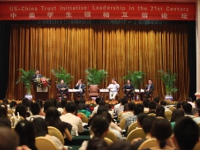Registration
Thank you!
You will receive an email confirming your registration.
IMGXYZ3142IMGZYXIn the coming decades, the character of the U.S.-China relationship will have great implications for the political stability and economic prosperity of the two countries and of the world. Currently, however, mistrust plagues the bilateral relationship between the governments and is evident in public discourse and in the Chinese and American media. Mistrust in the government, public, and media sectors is cyclical and mutually reinforcing. Steps are necessary in each sector to ameliorate U.S.-China mistrust and improve the relationship between the two countries.
The Carnegie-Tsinghua Center for Global Policy, in cooperation with the Global China Connection (GCC) and the Tsinghua Students’ Association for Global Affairs (SAGA), hosted a conference on building trust in the U.S.-China relationship. The conference brought together American and Chinese scholars, journalists, and business leaders, as well as students from Chinese and American universities, to discuss these issues. Rui Chenggang, an international journalist and CCTV anchor, and John Holden, managing director of Hill & Knowlton in Beijing, gave the keynote addresses. Carnegie’s Paul Haenle gave the opening address and introduced the keynote speakers.
Sources of Mistrust Between the United States and China
Mistrust exists between the governments and citizens of the United States and China, stemming from the complex, fast-moving nature of the relationship, and sometimes exacerbated by the media in both countries.
- Economic sources: Chinese students at the conference stated that the Chinese believe the United States is pressuring China to allow the yuan to appreciate in order to cripple China’s economy and preserve U.S. economic dominance. U.S. panelists consistently emphasized that the United States supports China’s economic rise. However, particularly since the global financial crisis, Americans perceive China as promoting itself and its success as an alternative to the U.S.-led economic system, therefore posing a challenge to that system. One American panelist stated that while both sides face great challenges, neither understands the difficulties the other is facing.
- Political sources: A Chinese student stated that lack of trust stems from the countries’ different national interests, citing America’s policy of selling arms to Taiwan as going against China’s national interests. An American panelist stated that U.S. arms sales to Taiwan do not contravene China’s national interests unless China plans to use military force against Taiwan, which the government has stated it does not plan to do. Another Chinese student questioned the U.S. reaction to China’s use of a military base in Pakistan, given America’s worldwide military presence. An American participant stated that the U.S. opposition is part of its complicated relationship with Pakistan and raised concerns about regional stability.
- The contribution of the media: The U.S. media feeds the perception that China is responsible for America’s economic decline, while the Chinese media accuses America of trying to hurt the country’s economic development. U.S. participants stated the American media market fosters sensationalism and a tendency to focus on single, negative events relating to China. In China, the media is more profit-oriented than before, and some outlets are now trying to be objective within the political constraints. One Chinese student stated that the dual function of the media is to educate the public and promote support for the government in society.
- Lack of transparency: U.S. and Chinese participants emphasized that transparency is an important element of trust between countries. American participants stated the U.S. policymaking process is more transparent and easier to understand than China’s. U.S. panelists also emphasized that increased transparency of governmental and public institutions in China would promote greater trust in U.S.-China relations and also increase the ability of Chinese people to constructively criticize their government’s policies.
Proposals for Building Trust
Chinese and U.S. panelists and students proposed several steps the United States and China could take to increase understanding and promote better relations between Chinese and American governments and societies.
- Government cooperation: Dr. Oros, a U.S. panelist proposed that the Chinese and U.S. governments can build trust beginning with interpersonal interactions, such as the U.S.-China Strategic and Economic Dialogue and joint training programs for military officers. They can also build trust indirectly by working together in areas of common interest, such as their efforts to combat piracy in the Gulf of Aden.
- Increasing understanding among scholars: Chinese and U.S. panelists both proposed that scholars in the United States and China should build greater understanding of the other country and the challenges the leadership faces. This could be achieved by establishing fellowships and departments specializing in relations with the other country. Scholars can then illuminate the challenges and difficulties facing the other country for policymakers and businesspeople in their own countries.
- Building exchanges and relationships: Chinese participant Dr. Han Zhaoying and U.S. participant Dr. Matt Ferchen agreed that relationships among individuals can contribute to strengthening bilateral understanding, as can speaking the language and understanding the culture of the other country. Programs that allow students to study abroad facilitate their ability to form their own understanding of other countries and develop relationships with people abroad.
- Changing students’ career decisions: Chinese participant Rui Chenggang argued that more of the top students in China and the United States are pursuing careers in business than in government and journalism. Reversing this would result in better-informed policies in both countries and better quality information being transmitted to the public, he said.
Discussants: He Liqiang, Bing Chenggang
